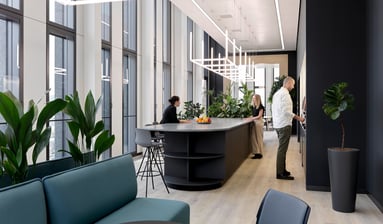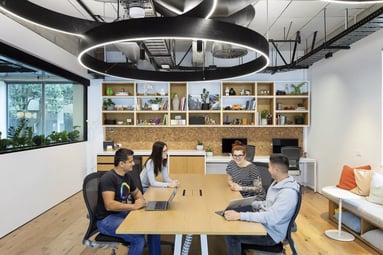Creating a more human workplace in the age of AI
In today's fast-paced world, full of change and complexity, technology is advancing at lightning speed, shaping our future in significant ways.
To keep up with the pace of change, businesses must adapt to their employee's evolving needs. Creating a human-centered workplace with heart is more important now than ever.
Hybrid working - striking the balance between connection and collaboration
With commute challenges and a cost-of-living crisis, companies must work harder to earn the commute, to create a destination that employees genuinely look forward to being in.
The shift to hybrid working has changed how workplaces are being used and the spaces and amenities required. Traditional workplaces don’t effectively support hybrid working. Organizations need to be more creative and office spaces need to work harder to provide value for their employees. Future-proofed workplaces need to balance both connection and concentration while providing flexibility for the future.
of employees are challenged by noise and disruptions in the office.
Our recent global research provides insight into the challenges and benefits employees are experiencing:
- 70% of employees are challenged by noise and disruptions in the office, leading to an inability to perform tasks effectively.
of employees value the office for social connections.
- 79% of employees value the office for social connections. We consistently hear that the office remains a central place for human connection, building culture, problem-solving and learning.
Unlocking human potential in the age of AI
Soon it will be the first time in history that five generations will be working together. Gen Alpha will enter the workforce in the early 2030’s and the digital natives will bring a set of new expectations to the workforce. They are expected to be adaptable, entrepreneurial and super tech-savvy. It is possible they may lack some interpersonal, face-to-face social skills and critical thinking due to their constant reliance on technology.
- 30% of Gen Alpha could be self-employed, working as freelancers in a global world of interconnectedness (Quilt.Ai, 2023)
- 60% of people think that permanent employees will be rare by 2035, (Citrix, 2020)
- A McKinsey survey suggests a third of jobs worldwide, across all sectors could be taken over by automation by 2030
This data suggests that our workforce may be smaller in the future, given the rise of freelancers and impact of technology on tasks.
2028 could be the tipping point where technology and AI begin to generate more revenue for organizations than humans (Citrix, 2020).
We have entered the fifth industrial revolution – an era where we’re tapping into the full potential of human-machine collaboration. It is a time when harnessing the power of the human mind will impact both humanity and the environment. It’s about cognitive intelligence understanding artificial intelligence to explore, connect and elevate the human experience.
It is critical that we prepare our future leaders, the Gen Z’s and Gen Alpha’s, to drive human value and use both cognitive and artificial intelligence to supercharge creativity and innovation.
Creating heart in the workplace
For many organizations, the office has lost its soul and the energy has changed. As technology continues to advance, the workplace must evolve to nurture talent, creativity, connection and belonging.
93% of employees want the workplace to support a sense of belonging (Deloitte, 2020)
Comparing the workplace to Maslow’s hierarchy of needs, demonstrates the importance of creating a workplace that evolves and supports its people:
- Basic needs: physical space, power, furniture, internet
- Psychological needs: good workplace culture, nutritious snacks, good coffee, access to end of trip facilities and public transport
- Self-fulfilment needs: a purpose-driven workplace, aligned with the organization’s values, prioritizing inclusion. People want to see themselves represented in the workplace and feel part of a community.
Only a third of the employee experience is made up of the physical place (Jacob Morgan, 2023). The workplace needs to also be a place that nurtures humans. It should be a place where we can have shared experiences, learn, and stimulate curiosity and creativity - unlocking the human potential.
Companies are successful when their own unique identity and personality is reflected in the physical space. Achieving this requires a tailored workplace strategy – to understand the organization’s values and strategies, assessing the needs of employers, employees and our future workforce, to translate this into an authentic workplace experience. This will enable a fulfilling workplace experience that is worth the investment and unlocks business performance, while supporting the human experience.
To tackle the big issues of tomorrow, our hybrid workplaces need to be more human and have more heart!
If you would like to learn more about our global workplace strategy and insights please reach out.

Lena Mueller leads the Strategy team for Unispace New Zealand and is passionate about creating people-centric, value-led environments. She has worked for organisations across the globe, including Europe, Asia, Africa and New Zealand. With over 14 years experience managing large and complex business transformations, Lena brings insights and learnings from her experiences to her work with Unispace clients.


